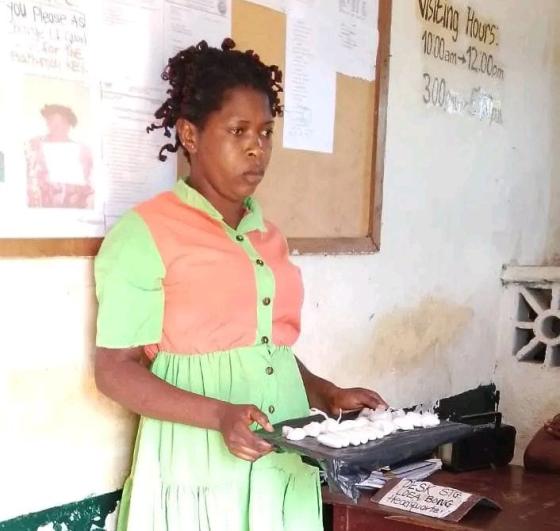Liberia: Woman, 26, Arrested with Drugs Worth Over US$6K

Suspect Helena Sulonteh
…. “The operation underscores a growing commitment from the Liberian government to crack down on drug-related criminal activities,” LDEA Bong County Commander Gokor said.
The Liberia Drugs Enforcement Agency (LDEA) has arrested a 26-year-old woman with a consignment of narcotic drugs worth US$6K.
Helena Sulonteh, who was arrested in Gbarnga, Bong County, was carrying 150 grams of heroin and raw cocaine. The arrest, LDEA claimed, was bolstered by intelligence from within the Sulonteh community, which is part of an ongoing crackdown into the illicit drug trade in Bong County.
“The valuable intelligence helps us to track the activities of this young woman, ultimately leading to her apprehension and the seizure of a significant quantity of unlawful substances,” Joseph Gokor, LDEA Commander in Bong County said.
“The operation underscores a growing commitment from the Liberian government to crack down on drug-related criminal activities.”
Solunteh, the LDEA noted, has admitted to being a regular dealer of narcotics in the county, which she often receives from a Nigerian national, whose identity she is yet to disclose.
However, Solunteh, who claimed to be a struggling mother, is pleading for forgiveness as she claimed to have gotten involved in the sale of narcotic drugs to take care of her children, the LDEA has said. The plea, according to Gokor, would not stop the ongoing investigation against her, which would result in prosecution.
Solunteh's arrest preceded the 54th Legislature’s passage of several amendments to the country’s drug law, making most offenses non-bailable.
The new law, which President George Weah is expected to sign anytime soon, includes stricter penalties for drug offenses and makes it extremely difficult for individuals charged with drug-related crimes to be released on bail.
What remains unclear is whether the LDEA would prolong Solunteh’s investigation to have her charged under the new law once signed by the President.
If Solunteh is charged under the law, she would fall in the category of a dealer, which makes her crime non-bailable until the trial is completed and, if found guilty, would be sentenced to life imprisonment.
This is a significant change from the previous law, which allowed individuals charged with drug offenses to be released on bail and sentenced to about 10 years in jail.
The legislators’ move is part of the government’s effort to combat drug-related crimes, which are becoming a major problem in urban cities across the country as criminals exploit the country’s weak security systems as well as its porous borders to carry out their illegal activities.
The problem of drug abuse is not new but the trend has become worrisome with a high prevalence rate of drug use among Liberian youth, which in turn fuels crimes, among other societal vices.
However, Solunteh's admission of engaging in the drug trade to support her family highlights the need for social and economic interventions, particularly in areas with high unemployment and poverty rates. With the new law, prisons are expected to quickly get overcrowded with traffickers and narcotics abusers, with no end in sight.
“Liberia, like many countries, has been grappling with the consequences of narcotics abuse which have devastating effects on individuals and the society as a whole,” Gokor noted. “But we are working hard across the country to disrupt supply chains, dismantle drug networks, and bring criminals to justice.”
Meanwhile, the LDEA team in Bong County, citing the arrest of Sulonteh, has warned individuals involved in drug trafficking that their actions will not go unpunished.
